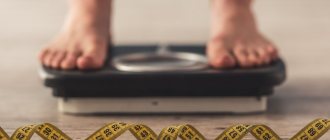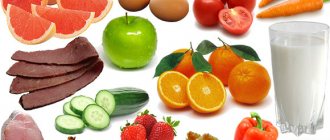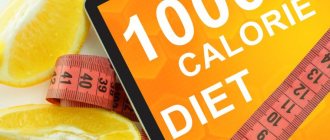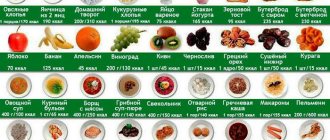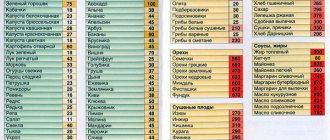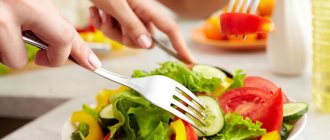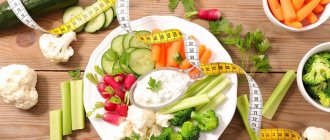If you eat 1500 calories a day, how much weight can you lose? How to calculate calories for the day
The Harris-Benedict formula has remained one of the most popular for many years. Since its creation, it has undergone several editions, because progress, changes in people's living and working conditions have greatly influenced energy costs. We will take the 1984 version of the Harris-Benedict formula.
For women:
447.593 + (9.247 × weight in kg) + (3.098 × height in cm) – (4.330 × age)
For men
88.362 + (13.397 × weight in kg) + (4.799 × height in cm) – (5.677 × age)
Using this formula, you will get your basic metabolism, that is, the number of kilocalories your body needs for a day spent on the couch at rest. To this number you need to add the energy you expend on household chores, work and training. This is done using the activity coefficient:
low, sedentary lifestyle (1.2) average activity, 1-3 workouts (1.375) high, 3-4 workouts per week (1.55) very high, hard work or 5-7 workouts (1.7) level of professional athletes and miners (1.9)
basal metabolic rate × activity ratio = your daily kcal requirement
The norm is the number of calories that you can consume in order not to gain weight.
You need to subtract 10-20% from the norm and find out how many calories you need to eat on a diet to lose weight.
Don't worry, you can calculate all this using our calculator.
Menu for 1500 kcal per day from simple products. Basic Rules
Please note that everything is individual. If you lead an active lifestyle, go to the gym and move a lot during the day, then such a diet is too poor for you. For active weight loss, you can still stick to it, but only in short courses. So, what should a 1200 kcal meal for a week be like using simple foods:
- In total it should include five meals. Of these, three are basic and two are snacks. The latter are allocated 300 kcal, the rest are divided between breakfast, lunch and dinner.
- Animal fats and fast carbohydrates are what lead to weight gain. They need to be reduced to a practical minimum. However, this rule can be broken, but not going beyond 1200 kcal. Eat a cake or a couple of chocolates, a large sandwich with sausage and mayonnaise, and with regret you will realize that until the evening you can only drink water, since the daily norm has already been chosen.
- The energy balance must be correct. This means that 50% of the selected products are sources of slow carbohydrates, 30% are proteins, and 20% are fats.
- During the day, distribute foods correctly, this is important, even if you carefully follow a 1200-calorie diet per day. It is most convenient to create a menu for the week on Sunday, and move carbohydrates to breakfast, proteins to dinner, and lunch can be a combined type.
- Drink plenty of water and avoid sugary drinks.
- Fresh vegetables and fruits should be on the table every day in sufficient quantities.
- “Empty” calories weigh too much in the daily diet. These are sweet soda, fast food and alcohol.
Why 1500?
Friends, do you think 1500 calories a day is a lot or a little? If you answer this question in the comments, we will probably see that the answers vary. For some, this is a lot, but someone with such a caloric intake will suffer from hunger.
If you remember, I recently wrote an article about balanced nutrition. It says that each person has his own calorie intake.
It all depends on weight, height, lifestyle, age, etc. I won’t talk about this again now. If you want, you can get acquainted with the information here - (maybe you can link to an article about balanced nutrition?)
For some reason, it is generally accepted that the daily calorie intake is 2000-2500 kcal. In fact, this value is not constant.
However, nutritionists agree that a person should not lower his diet below 1200 kcal. You can only make things worse for yourself - for example, slow down your metabolism.
As a result, doctors decided that a 1500 kcal diet would be good for someone losing weight. But only if he adds minimal physical activity.
If it is absent, then weight loss will not occur. But so does weight gain. Body weight will be maintained.
This is the opinion of nutritionists. It is based on the average person who goes to the office 5 days a week and eats on the run.
Well, friends, now I understand who exactly this diet is suitable for and why this figure of 1500 kcal “fell” from the sky.

1500 calorie menu with simple ingredients. Principles of nutrition
The main principle of the diet follows from the name: daily calorie intake should not exceed 1500. The components of the diet are healthy foods: fruits, vegetables.
You should eat meat at least once a day. It should be low-fat, acceptable: chicken, turkey, beef. It is also recommended to add fish, dairy products, and cereals to the menu.
The diet involves losing weight without stress or hunger: two snacks are allowed in addition to main meals. You are allowed to follow this diet for 2 to 4 weeks.
The principle of the diet follows from the name. The daily calorie intake is at around 1500. The main components of the new diet are healthy foods. If you follow the diet every day for a week, without harm to the body, weight loss is 1-1.5 kg.
Weight loss occurs gradually, which eliminates the possibility of regaining lost weight.
The 1,500 calorie diet involves eating five meals a day: three meals and two snacks. This principle of nutrition will allow the body not to feel hungry during the day. Daily meals occur at the same time: this disciplines the body.
Drink water every day: if you follow a diet, 1.5-2 liters per day. Drink clean water, without gases. Tea, coffee, freshly squeezed juices are not included in the water norm and count towards calories.
Try to have your last meal no later than 3 hours before bedtime: in a shorter period of time, the body does not have time to digest food, sleep becomes restless, and awakening is difficult. After waking up, drink a glass of water at room temperature. Drink the liquid in small sips.
Simple 1500 calorie menu. Diet for a week - menu 1500 calories for every day
We present a diet for a week with optimal calorie content: 1500 kcal per day. At the end of the article you will find links to the menu for each day of the week. These calories are quite enough: both to control weight, and not to feel hungry, and to enjoy eating. Today is the menu for Monday.
Have dinner no later than 4 hours before bedtime - especially since we planned an additional meal for the night. The whole day is divided into six meals: it is split meals in small portions that help reduce weight.
Please note: the menu contains practically no main culprits of excess weight – “fast” carbohydrates, with the exception of fruits. But there are “slow” carbohydrates - the main source of energy and a feeling of satiety, as well as quite a variety of proteins, fiber, essential vegetable fats and probiotics.
Ekaterina Belova, nutritionist, head of the center for personal dietetics “Nutrition Palette”: It’s a well-known fact that if you need to lose weight, you need to reduce the caloric content of your diet, and if you follow the laws of mathematics, then everything is simple: fewer calories – better results. However, our body is not so simple. He has daily physiological needs not only for energy, but also for a huge number of different nutrients. He also has a colossal ability to adapt to different living conditions and an instinct for self-preservation.
All this leads to the fact that hunger strikers lose weight not due to excess fat tissue, but due to muscles and water. Or the weight doesn’t come off at all (this is especially true for experienced “fighters” who like to experiment with different diets). In order for the body to be ready to part with its strategic reserves of adipose tissue, it needs an approach. The most important rule is that the daily caloric content of the diet should be no less than the amount of energy that the body spends on its vital functions at rest. On average, this is 1300 - 1800 kcal per day. Therefore, a diet of 1500 kcal is optimal and safe for the body.
Breakfast
For breakfast, it’s good to eat something grain and dairy to get energy and healthy probiotics. For example, oatmeal and a glass of yogurt. However, you can afford to deviate from this dietary laconicism. And also add an apple to your breakfast.
Cottage cheese salad with buckwheat Cooking time: 30 min.
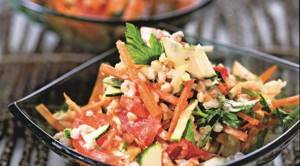
Lunch
If you are not lazy and prepare it the day before, then the temptation to eat a harmful sandwich will be put to shame, and your work colleagues will die of envy. However, you can share it with colleagues. You can add a couple of grain breads to the roll if your appetite urgently demands it.
Chinese cabbage curd roll Cooking time: 2 hours+

Dinner
Soup is not only a classic of the lunch genre, but also the basis of a healthy diet. Because there are healthy, not at all fatty soups. However, you can make up for it by seasoning the soup and not making the meatballs lean. And if you want to save several dozen calories, then simmer the onions for veal in the resulting broth, and not in oil.
Meatball soup Cooking time: 1 hour

Veal Flemish Cooking time: 1 hour
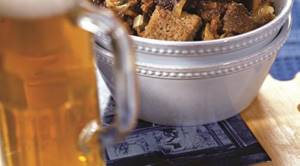
Snack
A couple of figs, a few nuts, herbal tea or coffee with lemon without sugar: carbohydrates for energy, fiber, minerals and vitamins. And most importantly - no fuss with cooking.
Dinner
You can finish the veal left over from lunch by adding a few lettuce leaves with a teaspoon of vegetable oil and a drop of vinegar. But it’s better to cook the remaining piece of veal with cherry sauce. However, an addition of lettuce leaves to such a dinner won’t hurt at all.
Veal with cherries Cooking time: 1 hour
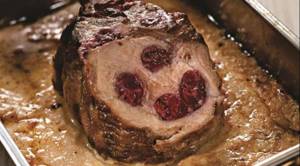
1500 calorie diet - menu for the week
To follow a weekly diet, use the table below. The calorie content of the daily diet does not exceed 1500 calories.
The first day's menu is the same as shown in the table above.
Other dishes are listed below.
Second day
| Eating | Dish |
| First breakfast | 150 ml tomato juice, 200 ml cappuccino, 200 gr. pilaf with squid, 70 g red bell pepper |
| Lunch | 2 pieces kiwi, 125 ml low-fat yogurt |
| Dinner | 250 ml mushroom puree soup, 150 gr. minced turkey roll stuffed with omelette, 100 gr. vinaigrette with seaweed and 5 gr. vegetable oil, strawberry compote |
| Afternoon snack | 1 banana, 125 ml yoghurt with cereals, |
| Dinner (4 hours before bedtime) | 0.1 kg low-fat cottage cheese, 150 gr. salad of fresh tomatoes, cucumbers and natural yogurt, a mug of green tea with mint |
| Before bed (1 hour before bedtime) | A glass of kefir 1% |
The third day
| Eating | Dish |
| First breakfast | 150 ml orange juice, 200 ml green tea, 200 g cottage cheese and carrot pancakes with sauce (natural yogurt 3.2%, cinnamon, raisins), 150 g Hercules milk porridge with banana |
| Lunch | 3 plums, 200 ml green tea with honey |
| Dinner | 200 ml rosehip decoction, 250 gr. quick canned fish soup, 150 gr. beef stew with kohlrabi, 100 gr. vegetable slices from tomatoes, herbs, lettuce leaves |
| Afternoon snack | 75 gr. dates, 200 ml hibiscus tea, |
| Dinner (4 hours before bedtime) | Zucchini stuffed with beef, rice, carrots, onions, 200 ml unsweetened tea with milk, 120 g. grated carrots with garlic and natural 3.2% yogurt |
| Before bed (1 hour before bedtime) | A glass of kefir 1% |
Fourth day
| Eating | Dish |
| First breakfast | 150 ml cherry juice, 200 ml cocoa with milk, 70 g eggs stuffed with mushrooms, 150 g. crumbly pearl barley porridge, 100 gr. tomatoes, lettuce leaves, greens with natural yogurt |
| Lunch | 150 gr. wild berry jelly, 1 baked apple stuffed with raisins |
| Dinner | 200 ml red currant compote, 150 g. stewed zucchini, 100 gr. beef azu with herbs and onions, 250 ml lentil stew with spinach and leeks |
| Afternoon snack | 150 ml carrot juice, 130 gr. pineapple |
| Dinner (4 hours before bedtime) | 200 ml chicory drink, 250 g squid Stroganoff style, 100 g. vegetable slices from cucumber and herbs, 150 gr. broccoli and potato puree |
| Before bed (1 hour before bedtime) | A glass of kefir 1% |
Fifth day
| Eating | Dish |
| First breakfast | 200 ml coffee, 150 ml fresh pineapple, 100 gr. low-fat cottage cheese, 150 gr. oatmeal cooked in milk with raisins, 120 gr. apple-carrot salad with natural yoghurt 3.2% |
| Lunch | 1 mango, 125 ml low-fat yoghurt |
| Dinner | 200 ml cherry compote, 50 gr. canned corn, 200 gr. beef goulash with pumpkin and apples, 250 ml Indian vegetable soup |
| Afternoon snack | 200 ml Robush tea, 75 gr. dried fruits |
| Dinner (4 hours before bedtime) | 200 ml tea with milk, 160 grams of white cabbage salad with herbs and celery, and juice of a quarter of a lemon, 200 grams. chicken breast stewed with mushrooms and prunes |
| Before bed (1 hour before bedtime) | A glass of kefir 1% |
Sixth day
| Eating | Dish |
| First breakfast | 150 ml cherry juice, 200 ml cocoa with milk, 150 gr. rice milk porridge, 140 gr. low-fat cottage cheese with strawberries and 3.2% natural yogurt |
| Lunch | 1 baked apple, 200 ml blueberry milkshake |
| Dinner | 200 ml berry compote, 150 grams of Greek salad (tomato, olives, onions, bell peppers, feta cheese and 5 grams of vegetable oil), 250 grams. sauerkraut cabbage soup |
| Afternoon snack | 1 pear, 125 ml low-fat yoghurt |
| Dinner (4 hours before bedtime) | 200 ml green tea, 100 gr. boiled chicken breast, 170 gr. salad of greens, radishes, cucumbers with the addition of 3.2% natural yogurt |
| Before bed (1 hour before bedtime) | A glass of kefir 1% |
Seventh day
| Eating | Dish |
| First breakfast | 150 ml grapefruit juice, 200 ml hibiscus tea, 140 gr. low-fat cottage cheese with apricot, 150 gr. oatmeal cooked with milk |
| Lunch | 1 pear, 125 ml dessert curd |
| Dinner | 200 ml cranberry juice, 100 gr. vegetable slices from tomatoes, 250 gr. fish soup, 150 gr. cabbage schnitzel baked with egg |
| Afternoon snack | 200 ml green tea with jasmine and honey, 75 g. mixtures of dried fruits and cashew nuts |
| Dinner (4 hours before bedtime) | 200 ml tea with milk, 250 gr. turkey breast stewed with leeks and bell peppers |
| Before bed (1 hour before bedtime) | A glass of kefir 1% |
